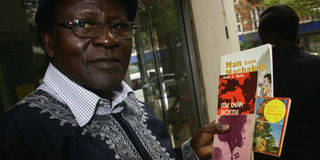It’s surprisingly tougher to write a book that will excite a child than entertain an adult

David Maillu displaying some of the books he authored, on January 31, 2013. According to Maillu, in order to create works that excite children successfully, you have got to develop a special art of story-telling. This is because children have their favourites. PHOTO| BILLY MUTAI
What you need to know:
- My first published book wasa children’s book titled Kisaluand his Fruit Garden. Since then, I have never stopped writing for children
- Although all of us who are adults were once upon-a-time children, it is not easy for us to put ourselves into the shoes of children to think like them
- You become aware of this problem particularly when you write for children. You can’t write for children successfully if you fail to think like them
Story-telling for children is as old as human life is, but different cultures tell them differently.
I have been telling my children stories powered by the awareness that African traditional story is very different from the present published form primarily imported from Europe.
Although all of us who are adults were once upon-a-time children, it is not easy for us to put ourselves into the shoes of children to think like them.
It is as if by the time we reach adulthood, the growing force obliterates childhood psychology.
You become aware of this problem particularly when you write for children. You can’t write for children successfully if you fail to think like them.
STORY- TELLING ART
My first published book wasa children’s book titled Kisaluand his Fruit Garden. Since then, I have never stopped writing for children.
As of today, I have about 40 titles for children ranging from the age of primary school to the secondary level. Surprisingly among those titles, some are more popular than others.
In order to create works that excite children successfully, you have got to develop a special art of story-telling. This is because children have their favourites.
The world of children is very complex and their values differ appreciably from adults’. For example, adults appreciate details; but details bore children.
To write a story that can move a child to tears, you will have to be a genius. Surprisingly, you can easily move adults to tears with your work, but not children.
This does not mean children have no feelings. In fact, children have a powerful baggage of feelings.
On the other hand, you can make children laugh easily with your works, but you will have to be specially talented in humour to make adults laugh.
BENEFITS OF SONGS
There is a great difference between traditional folk tales and the imported concept of story-telling for children.
Traditionally, most tales included melodious songs, which is an impossible genre in modern published stories unaccompanied by songs.
The special thing about songs accompanying a story is that the song makes the story more moving and appealing.
Later in life, even when you have forgotten the story, the song remains and accompanies you to your death.
From that perspective, the published story unaccompanied by song is primitive in impressing the child.
ILLUSTRATIONS
It may be given appealing coating through illustrations, but illustrations fall short of impressing the child the way accompanying songs do.
Again, traditionally every story was told loaded with a moral teaching. For example, it might be illustrated by a handsome man with a hidden third eye behind the neck, psychologically showing that people are individualistic in their behaviour.
We have good people and bad people. Or it might be illustrated by the ogre, which can appear in the form of an attractive human being.
Traditional, folk tales carried a lot of socio-psychological knowledge of human behaviour, which helped the person to interpret humans accurately in later years.
Deviation from that traditional presentation has introduced uncountable works, which aim purely at exciting the child — a kind of James Bond stories.
It may be about a cheeky character full or tricks on how to run away from danger. Others create characters which are super-human.
The absence of moral teaching in these stories means that they offer very little in moulding a good citizen when the reader becomes an adult.




